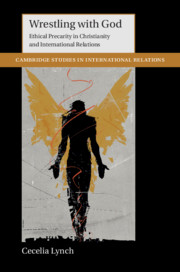Book contents
- Wrestling with God
- Cambridge Studies in International Relations: 152
- Wrestling with God
- Copyright page
- Dedication
- Contents
- Acknowledgments
- 1 Wrestling with God in the Modern West
- 2 Understanding Christian Wrestling about Ethics
- 3 Wrestling with the Violence of Conquest
- 4 Wrestling with War in a Modern World
- 5 Wrestling with the Violence of Oppression
- 6 Wrestling with Violence and Injustice Abroad and at Home
- 7 Has Anyone Prevailed?
- Bibliography
- Index
- Cambridge Studies in International Relations
4 - Wrestling with War in a Modern World
Published online by Cambridge University Press: 02 March 2020
- Wrestling with God
- Cambridge Studies in International Relations: 152
- Wrestling with God
- Copyright page
- Dedication
- Contents
- Acknowledgments
- 1 Wrestling with God in the Modern West
- 2 Understanding Christian Wrestling about Ethics
- 3 Wrestling with the Violence of Conquest
- 4 Wrestling with War in a Modern World
- 5 Wrestling with the Violence of Oppression
- 6 Wrestling with Violence and Injustice Abroad and at Home
- 7 Has Anyone Prevailed?
- Bibliography
- Index
- Cambridge Studies in International Relations
Summary
One of the many fascinating ironies about the 1930s and 1940s is the prevailing assumption in the west that the world was secular, even while Christian thinkers and theologians played prominent public roles and incorporated Christian ethics into their world views. Christians during the period sometimes saw themselves as the beleaguered other and other times embraced “secular” norms of social and political interaction as integral to their Christian ethics. These norms were embodied in movements ranging from communism and anti-imperialism to rampant bureaucratization and militarization. Many British and US (if not French) elites, including government leaders, academics, and the new legal professionals, came from a Christian formation, and scholars are recovering the ethical, including religious, formations of influential figures such as Herbert Butterfield, Norman Angel, and Arnold Toynbee, precursors of the contemporary English School.1 John Foster Dulles’s religious world view and its influence on the Commission for a Just and Durable Peace, Reinhold Niebuhr’s political theology and its foundational role in postwar international relations theory, and Jacques Maritain’s infusion of Christian personalism into transnational human rights all had theoretical and policy repercussions far beyond national boundaries. Other Christian activists and theologians – including Dietrich Bonhoeffer, Dorothy Day, A. J. Muste, Simone Weil, and the religious writers of the Harlem Renaissance – created lasting legacies on the ethics of addressing not only violence but also poverty, class, and race. As a result, they also need to be included in the Christian/IR/ethical pantheon of this era.
Keywords
- Type
- Chapter
- Information
- Wrestling with GodEthical Precarity in Christianity and International Relations, pp. 107 - 146Publisher: Cambridge University PressPrint publication year: 2020

